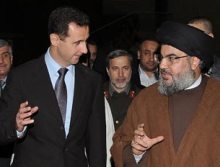 *By: Yavuz Baydar
*By: Yavuz Baydar
In Syria’s case, the game is practically over; it is now in extra time. Bashar Al Assad disappointed with yet another empty speech on Monday, raising international concerns to an even higher level.
As an editorial in Beirut’s Daily Star goes: “It was a speech filled with vague promises of reform, spattered with lofty — and, in all probability, false — proclamations of a desire to create a state akin to Plato’s Republic. Reforms were promised, but in a way so devoid of specificity as to make such pledges sound meaningless. The world has heard this before, two months ago, in fact. The level of trust in Mr. Assad has fallen so low that it is now virtually mandatory to question the authenticity of his desire to make good on reform oaths.”
Except the extremely naive, no one expected otherwise. We are dealing with a notorious police state whose mechanisms of survival are more than obvious. No language other than threats, oppression and killing is in its vocabulary.
While this is obvious, with the pattern unchanged, international brinksmanship is reaching the point of intense stress. The voices of experience repeat that the question is no longer if but when the collapse would occur. A reasonable estimation is one to three years, given the resiliency of the opposition.
But that is a dangerously long time for the internal conflict of Syria to spill beyond its borders. Lately, two reports indicate rather new patterns building up. Haaretz reported that Iran is displaying direct involvement by sending troops of its elite Republican Guard and Al Quds Force to help in the crackdown of the (mainly Sunni) uprising, while the Turkish Sabah daily reported joint activity inside and outside Syria between Iranian intelligence SAVAMA and the Syrian Mukhabarat.
And yesterday Lebanon’s reputed Daily Star published a news analysis which in detail notes “warmongering activity” within Hezbollah. “[It] is preparing for a possible war with Israel to relieve perceived Western pressure to topple Syrian President Bashar Assad, its guardian ally, sources close to the movement say. The radical Shiite group, which has a powerful militia armed by Damascus and Iran, is watching the unrest in neighboring Syria with alarm and is determined to prevent the West from exploiting popular protests to bring down Assad,” was the main chunk of the story.
Experts do not predict a full-scale war between countries in the region but do in limited parts of the area, to divert the pro-democracy thrust over Damascus. Given the nature of the new Lebanese coalition (dominated by pro-Syrian parties), it is a realistic scenario.
The Syrian regime has proven resilient to international sanctions before, and it has a very strong official memory of involving its regional big brother, Iran, and others further away, like Russia and China, when it needs rescue. This is now the phase, it seems, that is opening up.
It is dead already in the minds of the domestic majority, and wasted its credit in the eyes of the democratic world, but with a weak opposition equipped only with their hope and no weapons, “extra time” is now in favor of Mr. Assad and his clan.
What to do? The question has become much tougher. Strangely, concern over the consequences of a regime change may unite Iran and Israel, and Lebanon is fragile as it is. So, the danger of increased bloodshed over the opposition looms on the horizon, if the international community falls on its knees (again) due to the cynical calculations of realpolitik.
Perhaps one last chance must be given to Mr. Assad while soft power exercises continue. “Given Assad’s disappointing record, it’s doubtful that he can or will deliver. But it makes sense to test his offer — not least because such a process would terrify Mr. Assad’s patrons in Iran. If the dialogue fails, the Syrian demonstrations will be all the more potent, and Mr. Assad’s hold weaker… The right shepherds for Libya are its newly democratic neighbors, Egypt and Tunisia, backed by France, the United Kingdom and Germany. In Syria, the obvious mediator-in-waiting is Turkey’s Prime Minister Recep Tayyip Erdoğan, backed by the Gulf countries,” wrote David Ignatius of The Washington Post.
I am reluctant to be as hopeful but at the moment see no other way.
* Yavuz Baydar, a political commentator and a columnist for the Turkey-based Today’s Zaman.
al arabiya

Leave a Reply
You must be logged in to post a comment.